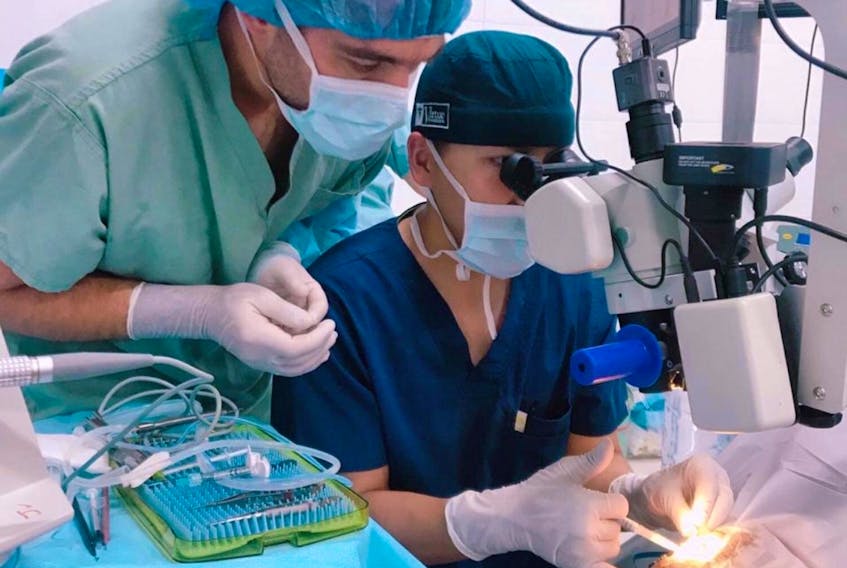CORNER BROOK, N.L. — Treating patients on the other side of the world who otherwise would never have access to cataract surgery has been an eye-opening experience for some Corner Brook vision care professionals.
Ophthalmologist Dr. Justin French and orthoptist/ophthalmic medical technologist Wanda McFarlane visited Mongolia for 12 days this past September and October as part of a contingent to treat preventable blindness in that country.
French has travelled to Mongolia for three consecutive years as part of the Mongolian-Canadian Medical Project.
It was the first time for McFarlane, an employee of French's, who was invited by the doctor to come along.

On previous trips, the group performed the procedures themselves, but have now started teaching local ophthalmologists how to treat preventable blindness in the long-term.
The project was started by Dr. Hugh Parsons in 2015.
French explained Mongolian ophthalmologists have traditionally functioned more on the level of an optometrist.
While there are a small number of ophthalmologists in the capital of Ulaanbaatar who can perform cataract surgery, the leading cause of preventable blindness, French said it’s not enough for the Mongolian population of three million people.
Parsons’ work started by bringing a Mongolian ophthalmologist to Canada to teach her how to do retina surgery. He has since raised money to build and open the first publicly-funded retina suite in Ulaanbaatar, the capital of Mongolia.
However, rural Mongolians have to travel long distances to Ulaanbaatar to get eye surgery.
So the team also makes two trips a year, in the spring and fall, to treat cataracts in rural Mongolia.

A team of Canadian and local professionals will truck out from Ulaanbaatar across the Gobi Desert, up to 20 hours away, to nomadic communities in the province of Gobi-Altai.
“They’re literally living in a nomadic culture in the desert herding camels and sheep for a living, but they can’t see because of cataracts,” said French.
Then they built a surgical centre from where they operate for a week or two.
French, who did his surgical retina fellowship under Parsons’ tutelage, is usually the primary cataract surgeon to travel in the fall.
Initially group members mainly performed cataract surgery themselves, treating hundreds of patients, he said.
Now the goal is to train 10 ophthalmologists per year in their residency training program, so within five years the procedures can be carried out without any Canadian assistance.
“This time, the entire goal of the trip had nothing to do with how many people we can operate on,” said French. “It’s how many skills we can transfer to local ophthalmologists so they’re that much closer to being able to look after the Mongolian people themselves.”

Challenges
According to French, the most challenging part centres on transportation and infrastructure.
If often takes 48 hours of travel just to reach rural Mongolia. There are flights to Toronto and Hong Kong first, which include stopovers.
Then, they have to clear all their equipment through customs, which can take several hours.
After entering Mongolia, they have to transport the equipment across the Gobi Desert.
French said they had trucks loaded with boxes stacked 10 to 12 feet high.
Upon arriving in rural Mongolia, infrastructure can be an issue.
He said there were three days one week when they had no running water in the hospital. Another week, they were two days without power.
“We had two microscopes, two cataract surgery machines and lighting plugged into one extension cord that was running off of a 1981 Honda generator out in the parking lot, with extension cords running through the building, down the side of the building and across the parking lot,” French explained.

Rewarding
Despite the challenges, French and McFarlance found the work and the entire experience incredibly rewarding.
McFarlane, who helped run the equipment to do the measurements before the surgeries, said it was fulfilling to see people come in after their procedures with their sight returned.
“These were people who were carried in on a family member’s back because they couldn’t see to walk,” she said. "It was rewarding to know we were part of that and that it was going to be better for so many people even after we left.”
She also loved being immersed in the culture.
“It’s an amazing experience for anyone who hasn’t seen how other people live,” she said.
They got a taste of that with a pretty unique gift from one of the patients.
One local woman gave them a five-gallon jerry can of camel’s milk as a thank you for removing her cataracts and returning her vision.
“She would have had no hope of ever having that corrected,” said French. “They couldn’t travel to Ulaanbaatar even if it was available there. You have to travel there and there’s just not the financial resources or equipment to do that if we didn’t go. So, it’s an incredibly rewarding place to go and they’re very appreciative people and very generous people.
“It’s a real special part of the world.”









